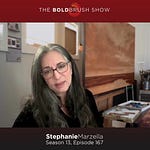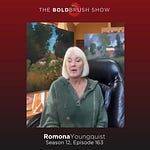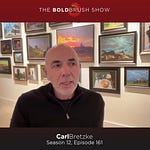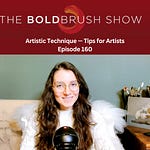Learn the magic of marketing with us here at BoldBrush!
https://www.boldbrushshow.com/
Get over 50% off your first year on your artist website with FASO:
https://www.FASO.com/podcast/
Join our next BoldBrush Live!
https://register.boldbrush.com/live-guest
---
For today's episode we created a compilation of advice from past podcast guests who tell us about the practical and creative aspects of pursuing an art career. They share insights on developing artistic skills, such as painting from life, practicing consistently, and mastering fundamental techniques. They emphasize the importance of passion, dedication, and continuous learning, advising aspiring artists to find mentors, join art groups, and not be discouraged by challenges. They also discuss the need to be authentic, develop a unique style, and not be overly focused on financial success. Overall, this compilation provides a comprehensive guide to navigating the artistic journey, highlighting both the creative and practical aspects of becoming a professional artist.
Episodes mentioned:
110 Robert Johnson
120 Kim Casebeer
122 Russell Gordon
123 Michael Orwick
124 Hilarie Couture
125 Mary Aslin
126 Scott Tallman Powers
127 Jill Basham
128 Sarah Yeoman
129 Brian Bateman
130 Scott Ruthven
131 Todd Casey
132 Keith Bond
133 Ginny Butcher
---
Transcript:
Robert Johnson: 0:01
I would say that it has to be a very strong and deep motivation to do this. I think
Kim Casebeer: 0:10
there's so much advice we could give, but I think the overall one that I really need to say is that you have to be authentically yourself, yeah,
Russell Gordon: 0:22
but make sure, absolutely sure, that that is what you want. That's Joseph Campbell's follow your bliss. If you know, if you're on someone else's path, it's easy, but it means it's not your path. Welcome
Laura Arango Baier: 0:37
to the bold brush show where we believe that fortune favors of bold rush. My name is Laura ankle Baier, and I'm your host. For those of you who are new to the podcast, we are a podcast that covers art marketing techniques and all sorts of business tips specifically to help artists learn to better sell their work. We interview artists at all stages of their careers, as well as others, putting careers tied to the art world in order to hear their advice and insights for today's episode, we created a compilation of advice from past podcast guests who tell us about the practical and creative aspects of pursuing an art career. They share insights on developing artistic skills, such as painting from life, practicing consistently and mastering fundamental techniques. They emphasize the importance of passion, dedication and continuous learning, advising aspiring artists to find mentors, join art groups and not be discouraged by challenges. They also discuss the need to be authentic, develop a unique style and not be overly focused on financial success. Overall. This compilation provides a comprehensive guide to navigating the artistic journey, highlighting both the creative and practical aspects of becoming a professional artist,
Robert Johnson: 1:41
I would say that it has to be a very strong and deep motivation to do this, that someone who's contemplating a switch like that shouldn't be doing it just because they don't have a job that they like Going into every day. You know, getting away from something, maybe it'd be better to switch to another job. But if you do have something that really feels deep inside of you, that that's what you're here on earth to do, then by all means, make the choice and but be prepared for the negative aspects of that, namely the income. But you might be surprised on that too. That's another one of these Earth unanticipated things. You don't do it for the money in the art world, but sometimes it happens, and if you pursue the high level of art, then you might be surprised. What happens to me? It was, it was a surprise because I was I was fair, and I had a wonderful wife who is also an artist, and she was what she I told her, we're going to have to probably endure a lot, and I may have to raise a garden, but she would. She was really willing to do that. She knew what I was up to and I appreciate that, but it didn't work out that way. Again. It was one of these girtha things that some galleries got my things, and I was able to send my daughter and stepson through college and have a decent life and not sacrifice so much from the economic side. And you might be surprised we do what you really want. And even if, even if the economics doesn't work out, and I have friends that and the times have changed in the art world too, but if you're doing what you really feel like you're here to do, and you love doing it, you won't have any regrets. You'll figure out a way to get through it. I think
Kim Casebeer: 4:18
there's so much advice we could give, right? But I think the overall one that I really need to say is that you have to be authentically yourself. Now. That is easier for me to say, perhaps, than somebody just starting out. And so I also tell people it is absolutely okay to to to look at different what what other artists are doing, and to maybe there's something about what they do that you click, that clicks with you, and you want to try that. And so you try on these different, these different hats. You try on being a, you know, this type of landscape painter, or a plein air landscape painter. And. Then after a while, though, after trying different things, you have to figure out for yourself what who you are and and I that's a very important aspect of being an artist. Eventually you have to start feeling comfortable in your own skin and not trying to pretend to be another artist just because they sell well, or some other reason that you that you find, yeah, so I it might be that might seem like kind of an abstract type of bit of advice, but, but I think it's so important. I really think it's so important. And we are, we are bombarded with all these images on social media and other at other places now, and so we see what everybody is doing, and I think now more than ever, it's so hard to get out of that mindset of looking at what everyone else is doing and reminding yourself of who you are?
Russell Gordon: 6:07
Um, yeah, I had people ask me this. Usually it's parents of of kids that you know are showing a dent towards, you know, art, I struggle with it. I don't have a one pat answer for everybody. If you're at the point where you are seriously considering it, I would ask myself, I'm sorry to be cynical, but I would ask myself, Is there anything else I can do? Because if there's something else you can do and have any level of contentedness in your life, maybe do that because art, being an artist is just sometimes. It's just sometimes terribly hard. But if you're past that point, and the answer is, No, I can't not do this. I have to do this, then I know it's hard not to recommend my own path. I would say train, go study. If that means taking workshops with artists. That's awesome. You find artists that you admire. Take their workshops if you really want to devote to, you know, like a like, like, we've been talking about an atelier classical program, apply and and go train yourself. You know, if you, if you want to be a doctor, you have to go to medical school, just, just training and it will make you a better artist. Don't be afraid that you will fall to conformity anything, but that it's quite the opposite, yeah, but make sure, absolutely sure, that that is what you want. That's Joseph Campbell's follow your bliss. If you know, if you're on someone else's path, it's easy, but it means it's not your path. So that's makes it inherently hard to to forge your own path. But it can be done. I think, you know, young people have a better in a lot of ways, a better way of it now than older people other generations. The Internet means you can go on and and study with people you admire on YouTube. You have YouTube tutorials and things like that, things that are just amazing. I just use YouTube mostly to fix my dishwasher and stuff. But there's other stuff too. He can learn how to do noble things on YouTube. So pursue it. Take it seriously. Don't be discouraged, or at least don't let the discouragement take the driver's wheel for too long. And never give up and enjoy it. Don't forget to enjoy it. It's a It's, um, it's a passion and a great luxury to be able to do it to any degree. You know, if you're painting in a garage or a bedroom or Palace, it's your space, it's your it's your sanctuary, it's the quad. And so you're, you're where you need to be. And how often, like do we get to say, I'm exactly where I need to be. I'm in my studio. This is where I am. This is where I am the meest me. I'm the true me.
Michael Orwick: 9:14
Um, what advice? I mean, I think that the way I did it worked out for me, is having a job that I just, you know, did less and less like having a job that was also I was learning important lessons again about working with people, being, you know, working with difficult clients, being in a bar, in restaurants, or, you know, you got a lot of difficult clients, so and then just being able to do less and less so, because I didn't really enjoy working in restaurants and bars, I was very ambitious to make my money on the other thing I was doing. So it didn't mean I waited for projects that made money to paint. I painted so that I could get more projects, get more galleries. I think too many people wait for things. To happen to them, and you've constantly gotta be working and constantly be doing work so that you can share the work. And you know, my daughter's in college right now, and it is not about her grades. I keep reminding her she's getting good grades, thank goodness. I mean, that's nice, but I'm like it. Nobody cares. No, never. Not even one time has anybody asked me, like, Okay, I want you to do this commission for me. What were your grades like in art school? It's all the portfolio. It's only the work that you can show that you've done before that's going to get you the next work, and no gallery is going to let you in because you like, I want to paint this, unless you've painted it already and can show it to them. So you just keep working and keep doing more of what you want. And it's a discovery, like, even what I want to do does change gradually over time, but, yeah, that's it. Just keep working perfect, keep playing, keep having fun, keep experimenting.
Hilarie Couture: 11:08
So I think to be dedicated, to go back to the fundamentals, it's so important. I think that if you're trying to be a representational artist anyway, that you really need to know how to draw and you need to understand all of the fundamentals. I think it's so important. I still go back to fundamentals when I find a problem in one of my pieces, it's got to be because, you know, I gave everything the same amount of importance, or, you know, I wasn't thinking about the composition. I was being too much of a slave to a photo that I took, or something like that. So I think just really getting a strong understanding of fundamentals is really important. And then also, if you don't have time to create on a, you know, regular basis, always try to keep yourself as educated as possible. So you know, podcasts and books and YouTube videos, and there's so many things that you can source now to help to grow honestly, and it's really important to keep yourself abreast and all that. I wish that I would have been more committed in my past to one art form so that I could, you know, at this point in my life, I would really be in a different level than I am now. But you know, it is what it is. So the advice is to, um, you know, I think it's important to, as I've already said, to continue to learn and grow. Take advantage of any opportunities you can, to get your self out there. There's some etiquette that you need to be aware of when you're going to a gallery opening. For instance, I know that I've had a show, and other artists will come in and want to talk to the gallery or the gallery manager about their work, and it's not the right time to do that, really. I mean, I feel like you can make a connection. You can introduce yourself and maybe mention that you're an artist, but don't take the thunder away from that person that's having their opening that night and try to monopolize the gallery manager. And, you know, talk about your own art. I think, you know, there's a time and a place for it. But also, if you're having struggles financially, it would probably be good to continue to work in some kind of field, especially, I mean, if it could be art related, like, think about maybe working in a frame shop or somewhere that you can continue to learn. And maybe it doesn't you're not exactly creating art. But I mean, look, all these years that I did hair, you know I was, I was making a living, even though I wasn't painting, I thought I had to make up for lost time, which I've tried to. But if you're struggling financially, that's the hardest thing, so make sure that you can take care of your your needs and get the bills paid. That's the first priority. And then, you know, commit yourself to a certain time every day, if you really want to get your art out there and get yourself a good website and try to learn things professionally and keep learning and keep growing. That's about all I can say. Never
Mary Aslin: 14:44
put the cart before the horse. First of all, always make doing your best work priority number one, and build your skills to that end. The second thing. I would that that I think, is really to carry it forward. How do I bring that, that art to the world? I know that the social media platforms are a really excellent way to do that. They're what they're not. My favorite way. I they serve a valuable function, and I'm grateful that I can keep in touch with people around the world, that that's the marvelous part. But I really have have, I really think weekend art shows are could be a wonderful Avenue. I personally have never done a weekend art show because I've had access to these summer long, entire summer long shows here in California, but I've heard other artists speak very highly of them. They, you know, allow you to bring the work to people directly. And art is about communication and and sharing. And I, you know, I've, I've said many times that to people that I've spoken with that the artist has this part of the circle. This is what the artist makes. This is the realm of the artist, the viewer. And they don't have to be a buyer. They can be an appreciator that says, they say, you know, I really, oh, that that, you know, the the light in in that floral painting just makes me feel happy. The circle is now complete, and art shows give you a really beautiful mechanism for building that relationship and completing the circle. Joining. Art groups can be incredibly beneficial, sharing with like minded artists. And you know, teaching you may you may not think, Oh, I'm not really any kind of a teacher. I think, I remember reading about, I think, studio and como naughty, who required their students to teach after the first year, so that, because that kind of propels you forward. So those things do your best work, art shows, collaborating with other artists and some teaching. Those are three really good ways just to establish a really good foundation. And you know, there are juried, juried art shows are also nice. I mean, receiving awards and art shows isn't the be all and end all, but it can. It can be significant for advancing your career as well.
Scott Tallman Powers: 17:46
Get hooked up with a get hooked up with a group of people that that get together to paint portraits or paint landscapes together. I started this, this group called plein air painters of Chicago, years and years ago, and they're still going on now, and they have a large group of people. They go out every Saturday and they paint outside. And is it being around other artists and and sharing your ideas and in their advice? And I learned a lot from people that I painted with about how I could get into shows and get into galleries and finding out a lot more information than I could have ever gleaned on my own, and and then doing like competitions, just getting up, getting your name out there, and because you never know when you might get discovered by a gallery, just Because you had your work in a show and and just content constantly, train constantly, practice all the time. And because it's always going to be your work is going to be the most important thing that you're going to be leading with. And you have to constantly get better and and we're still doing it now, you know, constantly training, constantly trying to get better and and talk to somebody that has some good business sense with, with building the business side of your,
Brian Bateman: 19:17
of your career.
Scott Tallman Powers: 19:20
Yeah, I, wish I would have done that earlier on. You know, I was just so fixated on the painting. Wasn't thinking as much as I should have been about building a foundation, like a business foundation, because that just wasn't the way my mind was working. I was obsessive, compulsive artist. Well,
Jill Basham: 19:41
there again. I think that there's probably more than one, but I would say my top would be to do what I inadvertently did when I first started, which was to take a drawing class even before painting. So I, I do recommend that. Um. And then I think what we were just talking about is learning to fail, that it that not every painting, that your painting is your process. It's not the finished product. So if you can sort of think about it differently and embrace the process of it, rather than constantly worrying about the finished product is my other thing. And then I think challenging yourself, and what we were already talking about is all you know, try to think of challenges things that you don't normally do. And I do also recommend that when you're first starting, you do have a limited palette, that you just have even just one of each of the primaries and white, and maybe, oh, I think each one, yeah, I think and white, and go from there and see, because you can, it's amazing how many colors you can mix from that that as well, as you can get your darks and your lights from from that as well. I think that the tendency for beginners might be to try and put out all the whole, you know, colors of the rainbow, but it will be much more your painting will end up being much more cohesive if you can have and work with a limited palette for as long as possible. Really, if
Laura Arango Baier: 21:32
you've been enjoying the podcast and also want to be able to ask our guests live questions, then you might want to join our monthly BoldBrush live webinars where our guest artists, guest marketing tips, share inspiring stories and answer your burning questions in real time, whether you're a seasoned painter or just starting your creative journey, this is your chance to connect, learn and spark new ideas, and whether you're stuck on a canvas or building your creative business, this is where breakthroughs happen. Don't miss out. Ignite your passion and transform your art practice by joining us. Our next BoldBrush Live Webinar is coming up on June 19, with our special guest, John Lasseter, you can find the sign up link in the show notes at BoldBrush. We inspire artists to inspire the world, because creating art creates magic, and the world is currently in desperate need of magic. BoldBrush provides artists with free art marketing, creativity and business ideas and information. This show is an example. We also offer written resources, articles and a free monthly art contest open to all visual artists. We believe that fortune favors the bold brush, and if you believe that too, sign up completely free@boldbrushshow.com that's BOLDBRUSH show.com. The BoldBrush Show is sponsored by FASO. Now more than ever, it's crucial to have a website when you're an artist, especially if you want to be a professional in your career. Thankfully, with our special link FASO.com/podcast. You can make that come true and also get over 50% off your first year on your artist website. Yes, that's basically the price of 12 lattes in one year, which I think is a really great deal, considering that you get sleek and beautiful website templates that are also mobile friendly, e commerce, print on demand in certain countries, as well as access to our marketing center that has our brand new art marketing calendar. And the art marketing calendar is something that you won't get with our competitor. The art marketing calendar gives you day by day, step by step, guides on what you should be doing today right now, in order to get your artwork out there and seen by the right eyes so that you can make more sales this year. So if you want to change your life and actually meet your sales goal this year, then start now by going to our special link, FASO.com/podcast. That's FASO.com/podcast.
Jill Basham: 23:52
It was a, you know, is a bit of a hurdle, and I think I went into it a little with a little bit of trepidation. I wasn't familiar with the art world, per se, but what I did know is that it was what I wanted to do. For sure, it was I knew that this was my direction, and and and that I had and have a passion for it. And if you feel like you have that passion for anything, but if you have the passion for painting, my advice is to try to not that you're not going to be afraid, but try to push fear away in which you know, and that's that was the beginning part of it, I was a little I was scared. I was scared to maybe participate in certain things. I I was scared to paint with other people. What would they think? Or even I think there can be fear about your own unique style. Style that might develop, which, by the way, I think that it's great to learn by copying, or if you there's work that you admire, to be inspired by that work. But I would say that as you, as I and as as my fellow artists progress, I think the thing is, is you're gonna develop your own style, whether you choose to or not. And I think it's much better to get off of that training of trying to emulate somebody and just embrace, embrace your you, what you you know, what you become. Your brush strokes are unique to you and and there's no changing it. I mean, it's just gonna, it's just gonna, it's just gonna pop up no matter what. So I think I got a little I went off, off track a bit there, but, but anyway, it was, it was a, it was a, a, it was a. I was nervous at the beginning, and then I just told myself that, although I have fear, just to push ahead. So I ended up entering competitions. And networking, which i i do recommend, getting to know fellow artists, getting to know artists that you admire, finding opportunities and and and I think the biggest thing is being brave for your for yourself, advocating for yourself, I would say, hold on to what made you want to do it in the first place, and keep the excitement and passion for what you're doing and don't It can be a very you can get very serious about stepping into a career in the arts, but I think you also need to remind yourself that you're doing this because of the joy that it brings You and to paint what you love,
Sarah Yeoman: 27:22
and it's never bad. It's just again. It's just a step to the next painting. And and we as human beings who have, you know, monkey on our shoulder, the critic that says, Oh, you're a failure. You can't paint. So if you have one day of painting, that's not exactly what you wanted to be. We get discouraged, and we we think, Well, why? Why am I even even bothering? I'm no good at this. Well, you only get good at it by practicing. You have to practice. You have to commit to it. It's not something you can do once a month and think that you're going to discover something new. So, you know, my advice to people that want to find their own voice is you really have to commit to it. And it's, it takes a lot. It takes a lot. It's like committing to exercising every day or eating right every day. You know, if you took 10 minutes a day and just got out your brush and moved some paint on a piece of watercolor paper. It'll work on an angle, even just, I just call it like color therapy. Just throw some color on a piece of watercolor paper. It is so joyful. It feels so good. And it doesn't have to be anything, but it does release something in you, and it will wake something up. And the more you do it, the easier it gets to do it. So I to students that say, Yeah, I just can't find the time. I don't have the right lighting. I'm like, Look, you're going to find every reason why you can't do it 10 minutes a day. Put a little table somewhere in your house. Leave it set up. Don't put it away, because then then it's so much work to get it back out again. So So give yourself that gift of a little space that belongs to you. Just get a good light. Leave the paint out, leave a piece of clean watercolor paper out, and throw a little paint once a day, you'll be much happier because of it. Yeah, and it doesn't have to be something, it doesn't have to have a resolution, it doesn't have to have a crescendo or or the end. It can just be whatever vatic it was really just your experience brought to fruition by color on a page or and then you can use those little studies. The next day you could do you know what to stray you could draw something on top of it, start to do a little firmer form on top of it, suggest light and shadow. So you could just lay paint. Down as an under painting. And again, it doesn't have to be something for it to be useful to you as a creative individual. Just paint. Just paint. You have to practice. There's no There's no mat. There's no way around that. You have to practice. There's no magic feather. There's no secret formula. I don't have a I don't have a particular brush that makes me better. I don't have a particular pigment, because everybody's like, Oh, what brush is that? Oh, what paint it. And it has nothing to do that. It just has to do with how many hours you put into practicing. So that would be my advice, is you have to, you have to treat it like it really matters to you. The only way to it's the only way to move forward with it. And it's hard, but it's the most wonderful thing you can do for yourself is to give yourself that that time and space to create.
Brian Bateman: 31:06
Grab a book, sit down and look at it again, yeah, and re reintroduce yourself to why you're doing this in the first place, and if you still have trouble, then then look around. They're out there. There is inspiration out there, no matter what genre, no matter what you're doing, there is something out there, somebody doing something different, that's going to flip that switch for you. And it's got, oh, I want to, I want I got it. I got to go the easel. Yes, another thing an artist said to me or not to me. But in general, is, even when you don't feel like you want to draw or paint, get down there and do it anyway, because it'll come, yeah, you start slinging paint around and get down there and start, it'll, it'll come to you. Even when you don't feel like it, even when you don't feel good. And I, you know, I'll wrestle with that. I don't feel good, or I don't I'm not in a good mental state. I've got to be in the right mental state to attack it. And so if I've been trying to get down there and trying to do that when I don't feel like it, when I'm not in the mental state, mental is so much part of what we do. We have to clear our heads, and we have to push life aside, and we have to be able to clearly focus on what it is we're trying to do. And sometimes life will get away like you mentioned, or or you're just mentally not there that day, or you don't feel well, but his advice was very, very great. But get down there and try it anyway, because it will come if you do, just start swinging it around. So I've had some good advice from a lot of people.
Scott Ruthven: 32:56
Well, yeah, I think paint from life, no matter where you're at, if it's in your studio. You know, you need to start there, because a camera, unless you're really great photographer, which I'm not, the nuances of light on the form, you know, you really need to observe from life. And one thing that I learned that I really didn't a lot of my the art that I loved and growing up, you know, were portraits and figured figurative work, and Shishkin, for example, who you have as your background there. I love the work, but I was never really drawn to it. I'm amazed by how it's done, right? Like, how did he do that? But it's not what I want to paint. So my advice, I guess, back to the question, is to paint from life and really study. And where I was going with the figurative and portraiture versus landscape is that, you know, the trees in the bat your background there, for example, their form, just like a face or a human right, the concepts and how you model light on form are the exact same. Your color mixtures might be a little different, but it's about, you know, relative mixtures, and studying how light falls off of a former, you know, informs what the form actually is doing. And you know, once you are out there and you observe from life, you start to see these things. You realize that. And so I think getting out there and painting from life is very important, and also not putting so much pressure on yourself to make finished work. It's, it's, you know, it can just be a heavy burden on your shoulder, like you never get out there. You never do it, because you think I've got all of this other stuff to do. And there was a period of time where I would spend I would, you know, just waste time procrastinating, because I would plan to paint. I'd plan to do this. I'd work to set things up. I just go all through all the motions to get to painting, but then I would wear myself out. I wouldn't have any energy to actually do the painting. So. So on that thread, I would say it's a great idea, no matter where or how small of a spot, have a space where your materials are set up and ready to go. If you have them all in drawers, you don't have any place to paint. Just the activity of getting all that together can drain your creative energy. So if you have a place and you know, you don't have to paint, you know, outdoors, necessarily, but let's say you've got a little spot in your garage or a basement or something, just set up a panel, get a palette there, have your paints ready, some brushes, all of that kind of thing. And then when the inspiration strikes, you can go out there. Now, if you're trying to be a professional, you can't wait for the inspiration. You just need to pick up the brushes and go every day. But I find that when I have a creative block, I'll just go out and mix paint on my palette. I'll take a couple of colors and I'll add white to it. I'll just say, Where could this go? A combination maybe that I haven't it's not a go to combination for me, and just getting that little bit of activity, going and color mixing, then all of a sudden I'm into it. I find myself pulling out a panel, messing around, and then three or four hours are gone, so paint more often, and that's how I do it. And paint from life for those would be the two things to you know, and painting from life will speed up your decision making process, as I mentioned earlier, that'd be my advice.
Todd Casey: 36:23
Focus on making sure that you're doing it out of the love for it. I mean, you know, a lot of the time I started by saying I like basketball, but basketball is kind of like the perfect example of it like a sport. Now I played, I played high school basketball. I didn't play college. I played a little bit of college, by the way, and then from college goes into the pros, right? But if you were to look at each one of those facets, you could look at us as artists in high school, as being the you and I are probably the best artist in our high school. Right from there, you're going to college, and you're taking all the best high school artists and putting them in one space right from there, you know, you can think about back to the sports analogy. Then you have all the best basketball players from each high school in college now, and NBA only drafts 60 players to go pro. And there's 128 teams, or 64 I can't remember how many in the Final Four that's out of all of the colleges in the country, and each team has 15 players on it, and 60 of them are going to make it to the next game, and 30 of them come internationally. Now these keep funneling down into like you may be great here, and then great here, and now you're getting into an atelier with all of the greats, and one may emerge, even if you're the best in the Tellier, that doesn't mean anything, because all of this comes down to desire to keep going. And a lot of the time I think I'm just the one that was passionate about this and just kept going and without a care of, like making money, because I can't not do it. It's a part of me. If you find art in that same way, you will probably make it, because making it has nothing to do with financial making it. It's just like be tenacious, and if you have a passion for the thing, just keep going and do it for life. The beauty of this, for me is that the basketball analogy most professional artists are done at 40, unless you're LeBron James and you're still playing. So I don't have to be at the mercy of any physical limitations. Unless my arms don't work anymore. I can continue to grow. Like I said, Max Ginsburg, at the age of 92 he still feels like he's getting better. It's an it's a thing that can just keep adding to your life to study other things and bring in external you know, as you said, science or maybe whatever it is, piano music or sports. I don't know it the list, it's endless. And you talk to all these artists, I'm sure they inspire you as well. You go home and you try out a different technique, or you're you heard of another artist that you hadn't heard of in the past, and now that's that little spark that pushed you this way, the same way have that curiosity and everything that you do, you can learn how to just keep learning forever. It's a it's a very rewarding career or way of living, I should say not so much career. Career sounds like it's always money driven, but, yeah, that's my two cents. If you're into it and you like that and you're doing it all the time, don't worry. You're creative and an artist, and everybody has it in them. It's just whether or not we've beaten it out of them, telling them sets of rules that they have to like this or that. If you start to hear that, I think it's time to leave and then be introspective and find out what it is you want. That's what I did when I went to grad school, because I lived in a little, tiny apartment by myself, and then every day, I just drew and then found out. What is it that I want to do? Nobody can tell me what that is, yep.
Keith Bond: 40:05
So from the art development side, so I have, I think the market, the newsletter would probably be my advice for the business side, although, I mean, there's so many other business things that are so important, but yeah, we'll stick with that one. We'll stick with that one. That's my advice. Is, if you want to build your business, build that relationship with your clients. On the art development side. Again, I think it's paint from life as much as possible, I think is the most valuable way that you can progress and grow as an artist. Also, I mean, it's hard to narrow it down to one single piece, yeah. I think the fundamentals so, yes, I come from a representational the representational realm. And there are people who may, you know, who come from a different school of thought, who might disagree with this, but I think learning the fundamental so called rules are actually liberating and not constraining. But you know, throughout my entire career, when I you know, there's you grow, and then you kind of plateau a little bit, and then you kind of feel like you're stuck, but then you grow again with every time that I've, you know, pushed through to try to figure out how to move to the next level, it has always been by coming back to those fundamentals, I used to put value is the most important and design closely relate. I mean, they're all interchange, inter connected. You can't, you know, talk about one without it affecting the other. But value and composition were the most important, then drawing and then color was lower. And I probably still think that that is the most I think that's the how I prioritize them. Even though I'm focused on color right now, I still think value is more important than color. So anyway, but my point is, go back to those fundamentals every time I come back, I'm at a higher level of understanding and learning and trying to figure it out, but it's the same principles over and over. So yeah, paint from life as much as you can, but return to the fundamentals and study those and and, yes, the more you understand about them, the more freeing you can be to throw it all away. You know, there are so many great artists who just their work is so they're breaking the rules, but you can tell they know them and understand them. You know, I know we're probably running long on time, but you know the the very first artists who really got into abstract, and all of the you know that stuff, when you look back in art history, they were trained in the fundamentals, but they deviated and went into the abstract or wherever they went with their art, and they did amazing stuff that changed art history. I think a lot of the problem with the abstract artists now is they don't have that foundation. They just looked at the end result that these artists came to and then try to go from there. But they didn't look at where those artists started from what knowledge and understanding they had to begin with. And I think if you have that foundation, you can go completely abstract. You can go in whatever direction you want. If you have that foundation of understanding to go from, I would
Ginny Butcher: 44:16
say, Find a mentor or a group who also is doing that, just find some people who can help you along the way, where you can brainstorm together, network, just support, encourage each other and, yeah, find the help that you need to do it and the support you need to do it and do it as as you're able. I mean, it's so different depending on your age and. You are at in life. I mean, if I was starting out, and of course, knew what I knew now, I'll just do it when I didn't, you know, because I didn't have any big expenses. I wasn't married, I didn't have kids, I had a dog. I, you know, my expenses were minimal. I was very mobile, and it's Yeah, do it, but find, find some, some people to come alongside you in it is, I think, big, yeah.










